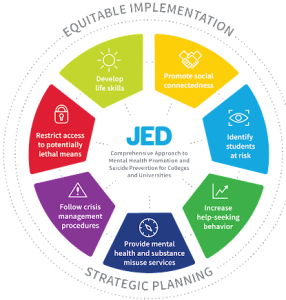
About JED Campus
JED Campus is a signature program of The Jed Foundation (JED) designed to guide schools through the collaborative process of comprehensive systems, program and policy development with customized support to build upon existing student mental health, substance use and suicide prevention efforts.
Sam Houston State University became a JED Campus starting August 2024. As part of JED Campus, SHSU will engage in a 4-year partnership with JED to evaluate and strengthen our programs and systems. Sam Houston joins nearly 500 campuses across the nation who are proud members of the JED Campus program!
Strategic Task Force
Sam Houston State University has developed an interdisciplinary, campus-wide task force that represents students, faculty, and staff. The task force will meet regularly to assess, support and implement program, policy, and system improvements. For questions related to the JED Campus strategic task force, please reach out to one of our co-chairs.
Co-Chairs
- Lindsey Lopez, Student Wellness, Division of Student Affairs
- Dr. Maribeth Jorgensen, Counselor Education, Division of Academic Affairs
Members
- Dr. Robert Williams, Student Health Center
- Dr. Rachel Valle, Dean of Students' Office
- Kyle Ashton, Residence Life
- Lisa Shen, Newton Gresham Library
- Dr. Meredith Conrey, CARE Network
- Chris Thompson, Athletics
- Jalon Berry, Strategic Retention Initiatives
- Lonnie Booker, University Police Department
- Emilee White, Integrated Marketing and Communications
- Hannah Jones, College of Osteopathic Medicine - Student Affairs
- Dr. Karen Nelson, College of Osteopathic Medicine
- Dr. Kelly Zinn, School of Nursing
- Dr. Helen Berg, Teacher Education
- Dr. Li-Jen Lester, COSET
- Dr. Diane Stoebner-May, Psychology
- Adeli 'Minet' Cortez, Student, Doctorate of Counselor Education
- Sofia Armenta, Student, Master's of Clinical Mental Health Counseling
- Emrys Acosta, Student, Bachelor's of Psychology
- Misha Hassan, Student, Master's of Public Health
JED Campus Framework
- The Framework

